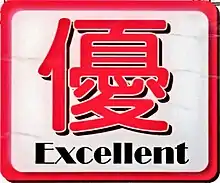優
See also: 优
| ||||||||
Translingual
Han character
優 (radical 9, 人+15, 17 strokes, cangjie input 人一月水 (OMBE), four-corner 21247, composition ⿰亻憂)
References
- KangXi: page 120, character 28
- Dai Kanwa Jiten: character 1261
- Dae Jaweon: page 254, character 26
- Hanyu Da Zidian: volume 1, page 233, character 4
- Unihan data for U+512A
Chinese
| trad. | 優 | |
|---|---|---|
| simp. | 优* | |
Glyph origin
| Historical forms of the character 優 | ||||||
|---|---|---|---|---|---|---|
| ||||||
|
References: Mostly from Richard Sears' Chinese Etymology site (authorisation),
|
| Characters in the same phonetic series (憂) (Zhengzhang, 2003) | |
|---|---|
| Old Chinese | |
| 憂 | *qu |
| 優 | *qu |
| 瀀 | *qu |
| 櫌 | *qu |
| 鄾 | *qu |
| 嚘 | *qu |
| 耰 | *qu |
| 獶 | *qu |
| 纋 | *qu |
| 懮 | *quʔ |
Pronunciation
Compounds
Derived terms from 優
|
|
|
Japanese
Kanji
優
Readings
Compounds
- 優女 (yūonna)
- 優々閑々 (yūyūkankan), 優優閑閑 (yūyūkankan)
- 優位 (yūi)
- 優先 (yūsen)
- 優利 (yūri)
- 優劣 (yūretsu)
- 優勝 (yūshō)
- 優勢 (yūsei)
- 優姿 (yūshi)
- 優婉 (yūen)
- 優弧 (yūko)
- 優形 (yasagata)
- 優待 (yūtai)
- 優性 (yūsei)
- 優曇華 (udonge)
- 優柔不断 (yūjūfudan)
- 優渥 (yūaku)
- 優生 (yūsei)
- 優男 (yasaotoko)
- 優男 (yasaotoko)
- 優秀 (yūshū)
- 優等 (yūtō)
- 優美 (yūbi)
- 優者 (yūsha)
- 優良 (yūryō)
- 優艶 (yūen)
- 優諚 (yūjō)
- 優越 (yūetsu)
- 優越感 (yūetsukan)
- 優退 (yūtai)
- 優遇 (yūgū)
- 優長 (yūchō)
- 優雅 (yūga)
- 優駿 (yūshun)
References
|
- Source: EDICT and KANJIDIC files licensed by the Electronic Dictionaries Research Group.
Korean
Hanja
優 • (u) (hangeul 우)
- This term needs a translation to English. Please help out and add a translation, then remove the text
{{rfdef}}.
Vietnamese
Han character
優 (ưu, viên)
- This term needs a translation to English. Please help out and add a translation, then remove the text
{{rfdef}}.
This article is issued from Wiktionary. The text is licensed under Creative Commons - Attribution - Sharealike. Additional terms may apply for the media files.






